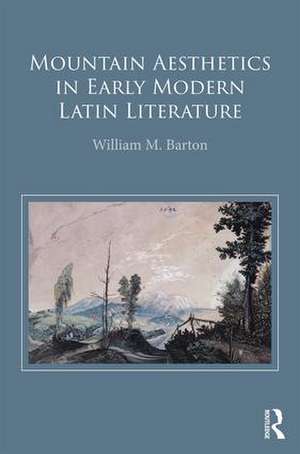Mountain Aesthetics in Early Modern Latin Literature
Autor William M. Bartonen Limba Engleză Hardback – 14 noi 2016
| Toate formatele și edițiile | Preț | Express |
|---|---|---|
| Paperback (1) | 256.32 lei 6-8 săpt. | |
| Taylor & Francis – 21 mai 2019 | 256.32 lei 6-8 săpt. | |
| Hardback (1) | 820.32 lei 6-8 săpt. | |
| Taylor & Francis – 14 noi 2016 | 820.32 lei 6-8 săpt. |
Preț: 820.32 lei
Preț vechi: 1178.39 lei
-30% Nou
Puncte Express: 1230
Preț estimativ în valută:
156.99€ • 163.29$ • 129.60£
156.99€ • 163.29$ • 129.60£
Carte tipărită la comandă
Livrare economică 14-28 aprilie
Preluare comenzi: 021 569.72.76
Specificații
ISBN-13: 9781138228641
ISBN-10: 1138228648
Pagini: 268
Ilustrații: 8 Halftones, black and white; 8 Illustrations, black and white
Dimensiuni: 156 x 234 x 22 mm
Greutate: 0.48 kg
Ediția:1
Editura: Taylor & Francis
Colecția Routledge
Locul publicării:Oxford, United Kingdom
ISBN-10: 1138228648
Pagini: 268
Ilustrații: 8 Halftones, black and white; 8 Illustrations, black and white
Dimensiuni: 156 x 234 x 22 mm
Greutate: 0.48 kg
Ediția:1
Editura: Taylor & Francis
Colecția Routledge
Locul publicării:Oxford, United Kingdom
Public țintă
Postgraduate and UndergraduateCuprins
Table of Contents
List of Illustrations
List of Abbreviations
Acknowledgements
Note on Neo-Latin Texts
Introduction
1. The Mountain in Latin: Literary Heritage
Josias Simmler’s De Alpibus Commentarius (1574)
The Mountain in Classical Literature
The Mountain in Classical Literature: Concluding Remarks
The Mountains of the Bible
The Mountains of the Bible: Concluding Remarks
2. Gaeographia, Prospectus, Pictura
Gessner Frames the Mountain
The Mountain in Chorography
Geography’s Rebirth in Germania
Prospectus and the Mountain in Text
Early Landscape Art and the Mountain
Latin and the Rise of the Landscape Genre
Geography and Landscape Art come together
Pliny Concludes: A View from Tuscany
3. Theologia et Philosophia Naturalis
The Disciplines and their Relationship
Natural Philosophy, Mountains of the Mind and Aesthetics
The Mountains and their Origins—l’état de question in 1561
Mountains in Genesis and Berhardus Varenius
A Smooth Primaeval Earth—Josephus Blancanus
Aesthetics of Nature in Theology: Commentaries on Genesis
The ‘Burnet Controversy’ and Mountain Aesthetics in Natural Philosophy
The ‘World Makers’, John Woodward and Dissertationes de Montibus
Scheuchzer’s Itinera Alpina and the Changed Mountain Aesthetic
4. Aesthetics of Nature: The Case of the Mountain Mentality Change
The Appreciation of Nature in Modern Philosophical Aesthetics—An Overview
Current Positions in the Aesthetics of Nature
The Natural Environmental Model
The Case of the Mountain Mentality Change
Methodological Considerations
Theism and Positive Aesthetics
The Role of Natural Science in Aesthetic Appreciation of Nature
Landscape and the Aesthetic Appreciation of Nature
Steno and Leonardo: the Tuscan Hills
Conclusions
Appendix
Annotated Bibliography
Preamble
Annotated List
Bibliography
Index
List of Illustrations
List of Abbreviations
Acknowledgements
Note on Neo-Latin Texts
Introduction
1. The Mountain in Latin: Literary Heritage
Josias Simmler’s De Alpibus Commentarius (1574)
The Mountain in Classical Literature
The Mountain in Classical Literature: Concluding Remarks
The Mountains of the Bible
The Mountains of the Bible: Concluding Remarks
2. Gaeographia, Prospectus, Pictura
Gessner Frames the Mountain
The Mountain in Chorography
Geography’s Rebirth in Germania
Prospectus and the Mountain in Text
Early Landscape Art and the Mountain
Latin and the Rise of the Landscape Genre
Geography and Landscape Art come together
Pliny Concludes: A View from Tuscany
3. Theologia et Philosophia Naturalis
The Disciplines and their Relationship
Natural Philosophy, Mountains of the Mind and Aesthetics
The Mountains and their Origins—l’état de question in 1561
Mountains in Genesis and Berhardus Varenius
A Smooth Primaeval Earth—Josephus Blancanus
Aesthetics of Nature in Theology: Commentaries on Genesis
The ‘Burnet Controversy’ and Mountain Aesthetics in Natural Philosophy
The ‘World Makers’, John Woodward and Dissertationes de Montibus
Scheuchzer’s Itinera Alpina and the Changed Mountain Aesthetic
4. Aesthetics of Nature: The Case of the Mountain Mentality Change
The Appreciation of Nature in Modern Philosophical Aesthetics—An Overview
Current Positions in the Aesthetics of Nature
The Natural Environmental Model
The Case of the Mountain Mentality Change
Methodological Considerations
Theism and Positive Aesthetics
The Role of Natural Science in Aesthetic Appreciation of Nature
Landscape and the Aesthetic Appreciation of Nature
Steno and Leonardo: the Tuscan Hills
Conclusions
Appendix
Annotated Bibliography
Preamble
Annotated List
Bibliography
Index
Notă biografică
William Michael Barton is a Post Doctoral Researcher at the Ludwig Boltzmann Institute für Neulateinische Studien, Austria.
Recenzii
"Barton’s careful documentation of the Neo-Latin scientific, artistic, and theological traditions which arose in the 15th-18th centuries as the first systematic attempts to fill in the gaps in our mountain knowledge support his thesis that those same texts were instrumental in promoting a new, positive sense of the mountain aesthetic. This book [provides] an opportunity to develop and refine personal environmental paradigms and sensitivities by considering landscape texts from a philological perspective, and recommend it for this purpose as well."
- David G. Smith, San Francisco State University
- David G. Smith, San Francisco State University
Descriere
In the late Renaissance and early modern period, man's relationship to nature changed dramatically. An important part of this change occurred in the way that beauty was perceived in the natural world and in the particular features which became privileged objects of aesthetic gratification. This study explores the shift in aesthetic attitude towards the mountain that took place between 1450 and 1750. Based on previously unknown and unstudied material, this volume now contends that it took place earlier in the Latin literature of the late Renaissance and early modern period.
